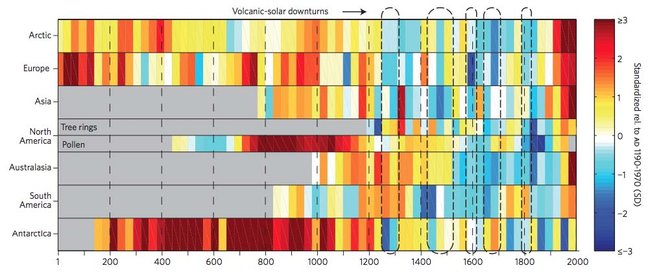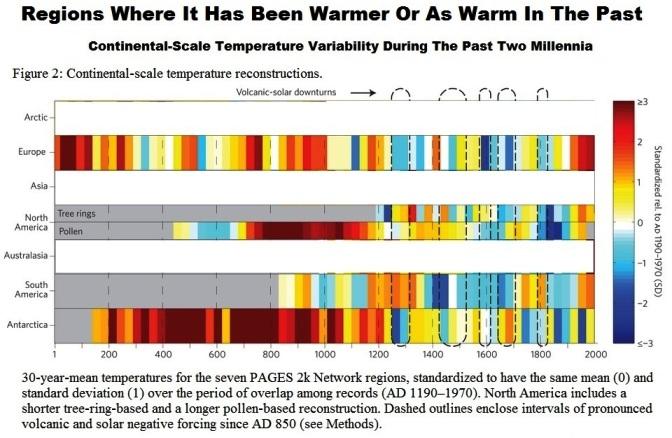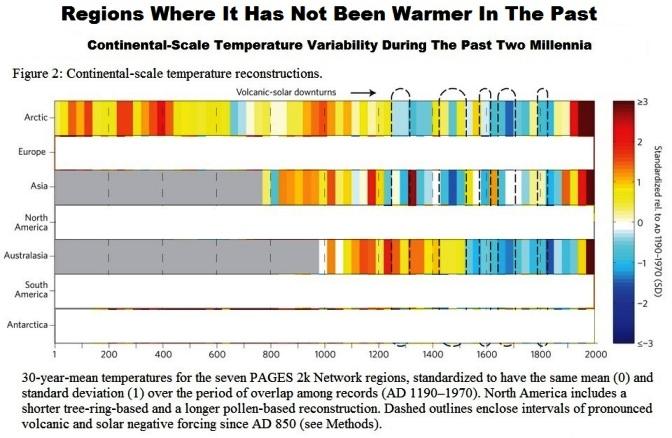It looks like you're using an Ad Blocker.
Please white-list or disable AboveTopSecret.com in your ad-blocking tool.
Thank you.
Some features of ATS will be disabled while you continue to use an ad-blocker.
5
share:
... in Germany, nurtured by the northerly warmth of atlantic sea - Micheal E. Mann

The general assertion that the climate change Earth went through over the last 150 years is 'unprecedented' and humanity has never before experienced similiar climate conditions, wether the magnitude or the rate of change, is not only unscientific it is simply not true.
Climate is always experienced regionally and in the last 2,000 years entire continents went through rapid changes, prolonged periods with substantially warmer or cooler temperatures than observed in the last century were rather the norm than the exception. The idea that pre-industrial climate has always been 'stable' and only began to change recently does not hold up against the historical perspective.
The Pages2k study (Past Global Changes) is the most comprehensive evaluation to date of temperature change at the surface of Earth’s continents over the past one to two thousand years. The regional focus on the past 2,000 years is significant for two reasons.
First, climate change at that scale is more relevant to societies and ecosystems than global averages. And second, “regional scale differences help us to understand how the climate system works, and that information helps to improve the models used to project future climate”.
Paleoclimatology is rapidly evolving field, but is not yet an exact science. The findings of more recent paleo-reconstructions can vary considerably compared to previous studies. One example are Europe's climate changes of the past. When exactly did conditions change so much that Agriculture was no longer possible at altitudes higher than today.
Mediterranean vegetation able to grow in Southern Germany until 1300 AD retreated much further south. As is evident on all other continents, Europe too has experienced many different, sometimes rapidly changing climate regimes over the course of the past two millennia.
The changes of the past appear to be not so different from the change we're experiencing now. The question, however, how do we contribute to the changes remains still unanswered.
What is wanted is not the will to believe, but the will to find out, which is the exact opposite.
B. Russell

The general assertion that the climate change Earth went through over the last 150 years is 'unprecedented' and humanity has never before experienced similiar climate conditions, wether the magnitude or the rate of change, is not only unscientific it is simply not true.
Climate is always experienced regionally and in the last 2,000 years entire continents went through rapid changes, prolonged periods with substantially warmer or cooler temperatures than observed in the last century were rather the norm than the exception. The idea that pre-industrial climate has always been 'stable' and only began to change recently does not hold up against the historical perspective.
The Pages2k study (Past Global Changes) is the most comprehensive evaluation to date of temperature change at the surface of Earth’s continents over the past one to two thousand years. The regional focus on the past 2,000 years is significant for two reasons.
First, climate change at that scale is more relevant to societies and ecosystems than global averages. And second, “regional scale differences help us to understand how the climate system works, and that information helps to improve the models used to project future climate”.
PAGES2k
Temperatures did not fluctuate uniformly among all regions at multi-decadal to centennial scales. For example, there were no globally synchronous multi-decadal warm or cold intervals that define a worldwide Medieval Warm Period or Little Ice Age.
- The period from around 830 to 1100 CE generally encompassed a sustained warm interval in all four Northern Hemisphere regions. In contrast, in South America and Australasia, a sustained warm period occurred later, from around 1160 to 1370 CE.
- The transition to colder regional climates between 1200 and 1500 CE is evident earlier in the Arctic, Europe and Asia than in North America or the Southern Hemisphere.
- By around 1580 CE all regions except Antarctica entered a protracted, multi-centennial cold period, which prevailed until late in the 19th century.
- Cooler 30-year periods between the years 830 and 1910 CE were particularly pronounced during times of weak solar activity and strong tropical volcanic eruptions. Both phenomena often occurred simultaneously. This demonstrates how temperature changes over large regions are related to changes in climate-forcing mechanisms. Future climate can be expected to respond to such forcings in similar ways.
In Europe, slightly higher reconstructed temperatures were registered in A.D. 741–770, and the interval from A.D. 21–80 was substantially warmer than 1971–2000. Antarctica was probably warmer than 1971–2000 for a time period as recent as A.D. 1671–1700, and the entire period from 141–1250 was warmer than 1971–2000.
A chart from a new study of temperature changes over the continents through 2,000 years. The colors denote the extent of warming or cooling (key at right). The bars denote 30-year periods during which the mean temperature was calculated.
Paleoclimatology is rapidly evolving field, but is not yet an exact science. The findings of more recent paleo-reconstructions can vary considerably compared to previous studies. One example are Europe's climate changes of the past. When exactly did conditions change so much that Agriculture was no longer possible at altitudes higher than today.
Mediterranean vegetation able to grow in Southern Germany until 1300 AD retreated much further south. As is evident on all other continents, Europe too has experienced many different, sometimes rapidly changing climate regimes over the course of the past two millennia.
Medieval Climatic Optimum
Europe experienced, on the whole, relatively mild climate conditions during the earliest centuries of the second millennium (i.e., the early Medieval period). Agriculture was possible at higher latitudes (and higher elevations in the mountains) than is currently possible inmany regions, and there are numerous anecdotal reports of especially bountiful harvests (e.g., documented yields of grain) throughout Europe during this interval of time.
Grapes were grown in England several hundred kilometers north of their current limits of growth, and subtropical flora such as fig trees and olive trees grew in regions of Europe (northern Italy and parts of Germany) well north of their current range.
Geological evidence indicates that mountain glaciers throughout Europe retreated substantially at this time, relative to the glacial advances of later centuries. A host of historical documentary proxy information such as records of frost dates, freezing of water bodies, duration of snowcover, and phenological evidence (e.g., the dates of flowering of plants) indicates that severe winters were less frequent and less extreme at times during the period from about 900–1300 AD in central Europe.
The changes of the past appear to be not so different from the change we're experiencing now. The question, however, how do we contribute to the changes remains still unanswered.
What is wanted is not the will to believe, but the will to find out, which is the exact opposite.
B. Russell
edit on 21-9-2013 by talklikeapirat because: i'm just a treeamer
reply to post by talklikeapirat
Take up the cause of fighting ignorance and apathy, defeatism and self-hatred, we are with you in your quest bold and honorable soldier of truth!
Take up the cause of fighting ignorance and apathy, defeatism and self-hatred, we are with you in your quest bold and honorable soldier of truth!
I live in Florida. Just back in the 20th Century, there were orange groves all the way into Northern Florida, including Jacksonville, FL. There were
old groves all around the area. We even had a county dock on the St. Johns River that was used to load the orange harvest on ships. However, the
freezes came further south damaging the orange harvests and trees. Just in recent times, the citrus industry moved south of I-4 a central Florida
highway because growing citrus North of I-4 was considered crazy due to freezes and losses. Now freezes are happening even south of I-4. In the last
couple of years we have seen cold fronts bringing cold temperatures all the way down into the Keys. I remember in 1989-1990 we had snow that actually
had some accumulation of about an inch in Jacksonville, FL. So, the regional temperature changes and fluctuations have been occurring in my part of
the world at least.
edit on 21/9/13 by spirit_horse because: (no reason given)
reply to post by spirit_horse
I do not live in the States, but i remember reading about the 'freak winter' in Florida in 2003.
It's completly understandable that people get suspicious when something is experienced for the first time, it's a completly different thing to immediately believe this has never happened before and must be a harbinger of doom.
Human activities can no doubt have a large impact on regional climate, but if that means the sum of all things can only lead to one inevitable outcome, then i want know exactly how.
A smart man once said: we live in the best of all possible worlds, so any change is considered dangerous.
This goes both ways.
It's actually possible to grow citrus and orange trees here in central europe, thanks to the genius of one man.
Sepp Holzer
I do not live in the States, but i remember reading about the 'freak winter' in Florida in 2003.
It's completly understandable that people get suspicious when something is experienced for the first time, it's a completly different thing to immediately believe this has never happened before and must be a harbinger of doom.
Human activities can no doubt have a large impact on regional climate, but if that means the sum of all things can only lead to one inevitable outcome, then i want know exactly how.
A smart man once said: we live in the best of all possible worlds, so any change is considered dangerous.
This goes both ways.
It's actually possible to grow citrus and orange trees here in central europe, thanks to the genius of one man.
Sepp Holzer
reply to post by greencmp
Thank you for your kind words.
There are many things i would like to see changed. We all do. But guilt-tripping everyone into submission seems to produce the exact opposite results. I refuse to accept we can't do better than this.
Thank you for your kind words.
There are many things i would like to see changed. We all do. But guilt-tripping everyone into submission seems to produce the exact opposite results. I refuse to accept we can't do better than this.
talklikeapirat
reply to post by spirit_horse
I do not live in the States, but i remember reading about the 'freak winter' in Florida in 2003.
Freak winter of 2003? Say whaa? 2003 was pretty chilly by my recollection, but it wasn't a complete freak winter. I believe the east coast of the state got a light dusting, as far south as the Vero Beach area. We definitely did not have any here on the west coast. To be honest, the "Freak Winter" of my lifetime thus far was 1989.
The great Tampa Bay snow of '89
St. Petersburg firefighter Rob Edwards witnessed it in eastern St. Petersburg. "There was snow," recalled Edwards, whose crew at Station No. 3 had responded to a report of downed wires. "The street was white as it could be. And there was snow on the side of the street covering everything."
I remember the snow clear as a bell, and I wasn't living north of Tampa where the official snowfall counts ended, we had just moved from another state to Venice, in south Sarasota County. It wasn't much snow, it was just a dusting, but it was snow. A light accumulation in the cracks of the roofs, balanced on the pine needles and tree limbs. I was told by my dad that it doesn't snow in FL, and I wouldn't be able to make a snowman. I looked out the window Christmas Eve morning, saw the snow, and said, "You lied, you said it doesn't snow here!" I've never seen my dad more flummoxed than he was then, lol.
More recently, 2010 was the coldest winter that brought snow my way. I didn't see any in my immediate area, but there were snow flurries and sleet very close by.
Picture gallery of some of the cold stuff. Most northerners would laugh their butts off, but this was really, REALLY cold for us:
Snow in Florida! See photos from our readers
Sorry, I didn't mean to hijack the thread, I just felt the need to clarify that 2003 wasn't particularly awful, nor unheard of. It's just very few & far between for dustings for us
reply to post by Nyiah
Thanks for sharing your experience and lending some perspective. I would have loved to see your Dad's face. When i think of Florida and snow, i'm imagining wool bikinis.
Here's picture from your link, it fits to Spirit Horse's post
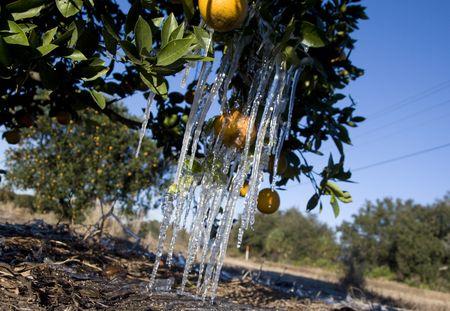
Here in Europe we were told that snow in winter will soon be a thing of the past. I will build a giant snowman next winter and i will call him Nostradamus.
Thanks for sharing your experience and lending some perspective. I would have loved to see your Dad's face. When i think of Florida and snow, i'm imagining wool bikinis.
Here's picture from your link, it fits to Spirit Horse's post

Here in Europe we were told that snow in winter will soon be a thing of the past. I will build a giant snowman next winter and i will call him Nostradamus.
edit on 21-9-2013 by talklikeapirat because: the spirits told me to
talklikeapirat
reply to post by Kali74
Yes, about PAGES. Are going to read the study?
PAGES2k pdf
Yes or I wouldn't have mentioned not being linked directly to the pdf. Why didn't you link the pdf to begin with? lol
reply to post by Kali74
You're right. I almost expect people are not going to read the stuff even when the link is there. It's a first, won't happen again.
You're right. I almost expect people are not going to read the stuff even when the link is there. It's a first, won't happen again.
reply to post by talklikeapirat
I'm not sure why you cite this study to support your determination that the assertion is incorrect.
It seems like you are trying to say that the conclusion of the study (and in general that the assertion of unprecedented warming is wrong) is wrong because there were decades warmer over the past 1400 years than in recent history.
The study examines past variability in order that we may be better able to separate out natural variability (noise) from anthropogenic forcing by looking at regional effects of global temperatures.
There's absolutely nothing in this study that supports you making this statement. Not if you consider that on the standardized scale:
0 = Same as 1971-2000
0-1 = Slightly warmer than 1971-2000
1-2 = Moderately warmer than 1971-2000
2-3 = Significantly warmer than 1971-2000
0--1 = Slightly cooler than 1971-2000
-1--2 = Moderately cooler than 1971-2000
-2--3 = Significantly cooler than 1971-2000
With that in mind perhaps looking at the graph again will show why there's no basis for you to make that statement. To my eye it's fairly obvious that even breaking down temperature records into 30 year periods warming or cooling trends appear to last hundreds of years, not decades, with only an insignificant few odd ball 30 year periods that don't match it's decadal/centennial neighbors.
The general assertion that the climate change Earth went through over the last 150 years is 'unprecedented' and humanity has never before experienced similiar climate conditions, wether the magnitude or the rate of change, is not only unscientific it is simply not true.
I'm not sure why you cite this study to support your determination that the assertion is incorrect.
. Recent warming reversed the long-term cooling; during the period ad 1971–2000, the area-weighted average reconstructed temperature was higher than any other time in nearly 1,400 years.
It seems like you are trying to say that the conclusion of the study (and in general that the assertion of unprecedented warming is wrong) is wrong because there were decades warmer over the past 1400 years than in recent history.
The study examines past variability in order that we may be better able to separate out natural variability (noise) from anthropogenic forcing by looking at regional effects of global temperatures.
in the last 2,000 years entire continents went through rapid changes, prolonged periods with substantially warmer or cooler temperatures than observed in the last century were rather the norm than the exception.
There's absolutely nothing in this study that supports you making this statement. Not if you consider that on the standardized scale:
0 = Same as 1971-2000
0-1 = Slightly warmer than 1971-2000
1-2 = Moderately warmer than 1971-2000
2-3 = Significantly warmer than 1971-2000
0--1 = Slightly cooler than 1971-2000
-1--2 = Moderately cooler than 1971-2000
-2--3 = Significantly cooler than 1971-2000
With that in mind perhaps looking at the graph again will show why there's no basis for you to make that statement. To my eye it's fairly obvious that even breaking down temperature records into 30 year periods warming or cooling trends appear to last hundreds of years, not decades, with only an insignificant few odd ball 30 year periods that don't match it's decadal/centennial neighbors.
reply to post by Kali74
No, this is not what i was saying. However, based on the reconstructions available for the study this conclusion cannot be drawn at all. Africa, the second largest continent is excluded from the study. Out of seven proxy records only two extend as far back as 2,000 years. Antarctica roughly 1,800 years. From the remaining four only the reconstruction for North America covers the 1,400 year period (and it's only half multiproxy). Without conclusive data for more than two thirds of the global land mass
this statement is essentially meaningless -
You'd need to ask the authors why this statement was included.
This is exactly what the study shows.

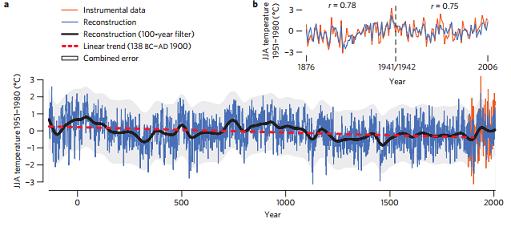
JJA temperature reconstruction and fit with regional instrumental data. a, The reconstruction extends back to 138 BC highlighting extreme cool and warm summers (blue curve), cool and warm periods on decadal to centennial scales (black curve, 100-year spline filter) and a long-term cooling trend (dashed red curve; linear regression fit to the reconstruction over the 138 BC–AD 1900 period).
Esper 2012
This is a reconstruction for Northern Europe (Scandinavia), not the continental average. Change - rather the norm than the exception.
It seems like you are trying to say that the conclusion of the study (and in general that the assertion of unprecedented warming is wrong) is wrong because there were decades warmer over the past 1400 years than in recent history.
No, this is not what i was saying. However, based on the reconstructions available for the study this conclusion cannot be drawn at all. Africa, the second largest continent is excluded from the study. Out of seven proxy records only two extend as far back as 2,000 years. Antarctica roughly 1,800 years. From the remaining four only the reconstruction for North America covers the 1,400 year period (and it's only half multiproxy). Without conclusive data for more than two thirds of the global land mass
this statement is essentially meaningless -
-the area-weighted average reconstructed temperature was higher than any other time in nearly 1,400 years.
You'd need to ask the authors why this statement was included.
Climate is always experienced regionally and in the last 2,000 years entire continents went through rapid changes, prolonged periods with substantially warmer or cooler temperatures than observed in the last century were rather the norm than the exception.
This is exactly what the study shows.

In Europe, slightly higher reconstructed temperatures were registered in A.D. 741–770, and the interval from A.D. 21–80 was substantially warmer than 1971–2000.

JJA temperature reconstruction and fit with regional instrumental data. a, The reconstruction extends back to 138 BC highlighting extreme cool and warm summers (blue curve), cool and warm periods on decadal to centennial scales (black curve, 100-year spline filter) and a long-term cooling trend (dashed red curve; linear regression fit to the reconstruction over the 138 BC–AD 1900 period).
Esper 2012
This is a reconstruction for Northern Europe (Scandinavia), not the continental average. Change - rather the norm than the exception.
edit on 22-9-2013 by talklikeapirat because: p_value
reply to post by talklikeapirat
I simply do not see change as norm in the chart, so I disagree with your premise. I think I temperature zone study would be more comprehensive. Considering that North America ranges from Arctic to Equatorial and Europe ranges from Arctic to Mediterranean... etc.
I'm not sure what you are seeing that indicates change as norm.
Substantially warmer
Substantially warmer
Substantially warmer
Substantially warmer
Substantially warmer
Slightly warmer
Moderately warmer
Slightly warmer
Substantially warmer
Moderately warmer
Same
Slightly cooler*
Slightly warmer
Same
Slightly warmer
Moderately warmer
Moderately warmer
Moderately cooler*
Same
Same
Slightly warmer
Slightly warmer
Slightly warmer
Slightly warmer
Substantially warmer
Substantially warmer
Slightly warmer
Same
Slightly warmer
Substantial warmer
Moderately warmer
Substantially warmer
Substantially warmer
Substantially warmer
Slightly warmer
Slightly warmer
Same
Moderately cooler*
Slightly warmer
Moderately warmer
Moderately warmer
Slightly warmer
Moderately cooler
Moderately cooler
Same
Moderately warmer*
Same
Moderately cooler
Went afk and lost my place... think you get the idea though.
Again the graph shows relative stability up until the late 1800's.
I simply do not see change as norm in the chart, so I disagree with your premise. I think I temperature zone study would be more comprehensive. Considering that North America ranges from Arctic to Equatorial and Europe ranges from Arctic to Mediterranean... etc.
This is exactly what the study shows.
I'm not sure what you are seeing that indicates change as norm.
Substantially warmer
Substantially warmer
Substantially warmer
Substantially warmer
Substantially warmer
Slightly warmer
Moderately warmer
Slightly warmer
Substantially warmer
Moderately warmer
Same
Slightly cooler*
Slightly warmer
Same
Slightly warmer
Moderately warmer
Moderately warmer
Moderately cooler*
Same
Same
Slightly warmer
Slightly warmer
Slightly warmer
Slightly warmer
Substantially warmer
Substantially warmer
Slightly warmer
Same
Slightly warmer
Substantial warmer
Moderately warmer
Substantially warmer
Substantially warmer
Substantially warmer
Slightly warmer
Slightly warmer
Same
Moderately cooler*
Slightly warmer
Moderately warmer
Moderately warmer
Slightly warmer
Moderately cooler
Moderately cooler
Same
Moderately warmer*
Same
Moderately cooler
Went afk and lost my place... think you get the idea though.
In Europe, slightly higher reconstructed temperatures were registered in A.D. 741–770, and the interval from A.D. 21–80 was substantially warmer than 1971–2000.
JJA temperature reconstruction and fit with regional instrumental data. a, The reconstruction extends back to 138 BC highlighting extreme cool and warm summers (blue curve), cool and warm periods on decadal to centennial scales (black curve, 100-year spline filter) and a long-term cooling trend (dashed red curve; linear regression fit to the reconstruction over the 138 BC–AD 1900 period).
Esper 2012
This is a reconstruction for Northern Europe (Scandinavia), not the continental average. Change - rather the norm than the exception.
Again the graph shows relative stability up until the late 1800's.
I don't know much about climate change but, wouldn't fluctuations in atmospheric pressure have a greater impact on atmospheric cooling and warming
than concentrations of greenhouse gasses?
My Grandmother used to use a pressure cooker to make candy and other meals when I was a child. I seem to remember the device allowed foods to get much hotter, without all the water boiling away during the cooking process. This of course would not be the same with cooking food in a regular pot.
My Grandmother used to use a pressure cooker to make candy and other meals when I was a child. I seem to remember the device allowed foods to get much hotter, without all the water boiling away during the cooking process. This of course would not be the same with cooking food in a regular pot.
reply to post by Kali74
No it doesn't, unless you have a completely different definition of stability than anybody else.
- Stability: continuance without change; permanence.
You've picked the single argument that is not supported by the study itself. You and me, we still don't know if the recent change has different causes than the changes of the past. We do know that climate variability is the regular mode.
The claim humans have never experienced changes similiar to the one we're experiencing today is nonsense and not supported by science. That is what the OP was about.
Are you turning into a contrarian?
What is wanted is not the will to believe, but the will to find out, which is the exact opposite.
__________________________________________________________________________________
Reconstruction by one of the authors of the PAGES study.
Pairwise comparisons to reconstruct mean temperature in the Arctic Atlantic Region over the last 2,000 years
 Most pronounced warming and cooling trends, calculated by finding the window with the steepest linear trend for each
window size from 10 to 400.
Most pronounced warming and cooling trends, calculated by finding the window with the steepest linear trend for each
window size from 10 to 400.
I see change.
Again the graph shows relative stability ...
No it doesn't, unless you have a completely different definition of stability than anybody else.
- Stability: continuance without change; permanence.
The reconstruction extends back to 138 BC highlighting extreme cool and warm summers (blue curve)
You've picked the single argument that is not supported by the study itself. You and me, we still don't know if the recent change has different causes than the changes of the past. We do know that climate variability is the regular mode.
During the current interglacial period, Earth’s climate has undergone significant climate variations that have yet to be quantified at the continental scale, where climate variability is arguably more relevant to ecosystems and societies than globally averaged conditions.
The claim humans have never experienced changes similiar to the one we're experiencing today is nonsense and not supported by science. That is what the OP was about.
Are you turning into a contrarian?
What is wanted is not the will to believe, but the will to find out, which is the exact opposite.
__________________________________________________________________________________
Reconstruction by one of the authors of the PAGES study.
Pairwise comparisons to reconstruct mean temperature in the Arctic Atlantic Region over the last 2,000 years

I see change.
edit on 23-9-2013 by talklikeapirat because: The only constant is change.
new topics
-
A Merry Christmas.
Other Current Events: 6 hours ago
top topics
-
Cold Blooded Killers on Christmas!! GRRRRrrr!!
Pets: 13 hours ago, 9 flags -
A Merry Christmas.
Other Current Events: 6 hours ago, 6 flags
active topics
-
London Christmas Market BANS Word ‘Christmas’
Social Issues and Civil Unrest • 53 • : Xtrozero -
‘Something horrible’: Somerset pit reveals bronze age cannibalism
Ancient & Lost Civilizations • 24 • : Xtrozero -
Plane Crash Today --Azerbaijanian E190 passenger jet
Mainstream News • 23 • : Xtrozero -
It's Offical Now
US Political Madness • 23 • : Oldcarpy2 -
More Bad News for Labour and Rachel Reeves Stole Christmas from Working Families
Regional Politics • 12 • : gortex -
A Merry Christmas.
Other Current Events • 4 • : AlroyFarms -
Cold Blooded Killers on Christmas!! GRRRRrrr!!
Pets • 11 • : charlest2 -
The Effects of Electric Fields and Plasma on Plant Growth
Science & Technology • 11 • : ChaoticOrder -
Mood Music Part VI
Music • 3765 • : BrucellaOrchitis -
-@TH3WH17ERABB17- -Q- ---TIME TO SHOW THE WORLD--- -Part- --44--
Dissecting Disinformation • 3814 • : brewtiger123
5

